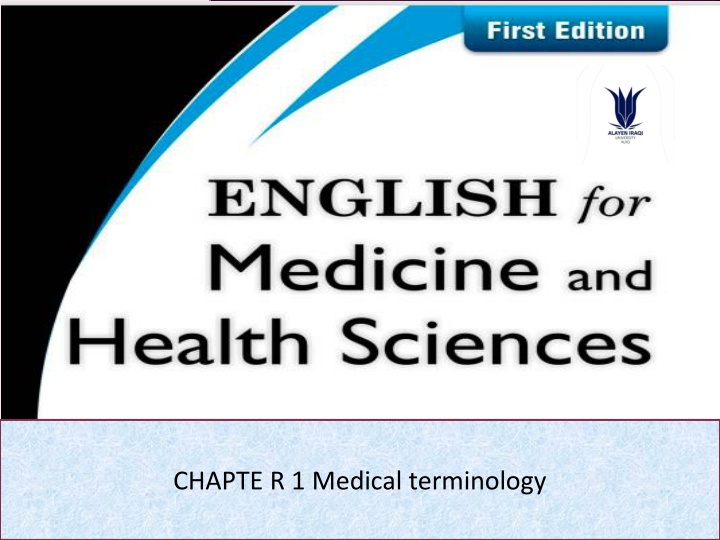
Medical Terminology: Importance and Origins
Medical terminology plays a crucial role in healthcare communication, with roots in Latin and Greek languages. Learning these terms aids in efficient communication, treatment, and documentation in the medical field.
Download Presentation

Please find below an Image/Link to download the presentation.
The content on the website is provided AS IS for your information and personal use only. It may not be sold, licensed, or shared on other websites without obtaining consent from the author. If you encounter any issues during the download, it is possible that the publisher has removed the file from their server.
You are allowed to download the files provided on this website for personal or commercial use, subject to the condition that they are used lawfully. All files are the property of their respective owners.
The content on the website is provided AS IS for your information and personal use only. It may not be sold, licensed, or shared on other websites without obtaining consent from the author.
E N D
Presentation Transcript
LIST OF CONTENTS Terminology The Significance of Learning Medical Terms What is the Medical Term Roots Suffixes Spelling of medical terms Pronunciation of medical terms Test Set by Lect. Dr. Laith &Osama / Lect. 1 Home work
TERMINOLOGY It is the set of terms, expressions, or symbols associated with a certain discipline of study, profession, or activity. Developing a functional competence in terminology is an essential component of being able to work in a medical field or profession. Medical terminology is the variety of language that health care professionals and providers use in practicing their careers. Many medical terms nowadays have been borrowed from ordinary English words such as scanning and screening In order to learn the meanings of medical terms, students need to familiarize themselves with the way medical terms are structured and created.
Latin and Greek Origins of Some Current Medical Terms Current Term Current Term artery cardi(o) the heart Greek kardia cell vein nerve gastr cancer Origin Origin Latin arteria; Greek arteria Latin cella Latin vena Latin nervus Greek gaster (stomach) Greek carcin
Medical terms constitute a standardized means of communication among health-care providers because all such specialists use special terminology to describe human body, diseases, symptoms, diagnostic procedures, drug, and treatment in the fields of medicine. Medical terms are used in both speaking and writing during the process of communication between health care professionals and their clients
The Significance of Learning Medical Terms Medical terms enable health care workers to communicate efficiently with each other and with their patients in one language. They ensurecomplete and mutual understanding of patients issues, including diagnosis and treatment. Medical terms help us decipher complex information because they are made up of roots, prefixes, and suffixes. Medical terms facilitate the process of documentation and make it easy and fast due to the frequent use of abbreviations in recording medical information.
Roots Medical Term Combining Forms Suffixes Prefixes
ROOTS A root is the part of a word that carries its basic meaning. The root in medical terms cannot stand alone to give a complete meaning. A prefix or a suffix may be added to it in order to make a full term that has meaning. visual examination of the stomach stomach Visual examination
Otology rhinology science of ear science of nose laryngology science of Larynx
Developing a functional competence in terminology A. essential component , B. unimportant component, C. right component. D. assessment component Spelling of medical terms The Latin word of nerve is . it is necessary that learn the correct spelling of the terms you use in your field A. vena , b. nervus , c. never , d. ever Correct spelling to writing is as important as correct pronunciation to speaking. Medical term consist of A . Root , B. suffix C. prefix D. all of them Rhinology means 1. Science related with nose 2. Science related with Larynx 3. Science related with Ear
I WISH YOU HAVE A Nice Interesting and Useful lecture
